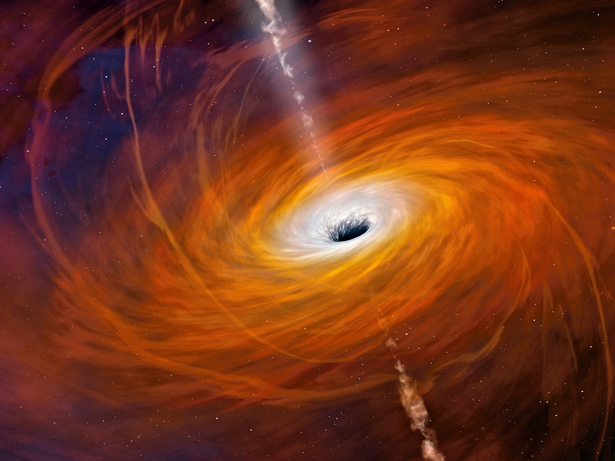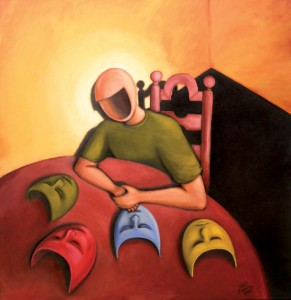Even the most brilliant and careful scientist is susceptible to bias. As philosopher Daniel Dennett has said, “Nobody is immune to wishful thinking.” Is there an approach other than the scientific method that counters this universal human tendency?
 As recently reported in an article about escaping from black holes, “a tenet of modern physics is that it is always possible in theory to reverse time, run the proverbial film backward and reconstruct what happened in, say, the collision of two cars or the collapse of a dead star into a black hole.”
As recently reported in an article about escaping from black holes, “a tenet of modern physics is that it is always possible in theory to reverse time, run the proverbial film backward and reconstruct what happened in, say, the collision of two cars or the collapse of a dead star into a black hole.”
This premise is stretched to its limits when considering what happens to the ‘stuff’ (matter, energy and space itself) that gets sucked into a black hole. Matter may be destroyed, but its “information” —its essential physical attributes — lives forever.
Since “information” cannot be lost, the fundamental premises and rules of physics seem to break down when considering black holes, from which nothing, not even light, can escape. This became known as the “information paradox,” which “challenges foundational beliefs about what reality is and how it works.”
Stephen Hawking first postulated that “information” could be lost in a black hole. Then he backtracked, incongruously saying that the notion of a “past” itself would be in jeopardy, and we couldn’t even be sure of our own histories. Apples and oranges Stephen!
Hawking was able to show through his mathematical calculations that black holes aren’t eternal prisons, but that they eventually ‘leak’ and “then explode in a fountain of radiation and particles.”
His calculation “was hailed as a breakthrough in understanding the connection between gravity and quantum mechanics, between the fabric of space and the subatomic particles that live inside it — the large and the small in the universe.”
But Hawking goes much further, and conflates science with psychology. If the rules break down in black holes, they may be lost in other places he warns.
“If foundational information disappears into a gaping maw, the notion of a ‘past’ itself may be in jeopardy—we couldn’t even be sure of our histories. Our memories would be illusion.”
Why should we be sure of our histories? Isn’t that one of the great sources of conflict and war throughout history, made even more distorted and dangerous in a global society?
Besides, in one sense our memories are illusions, since they are not what is, but how we remember what was.
Hawking reveals his underlying bias when he says, “It’s the past that tells us who we are. Without it we lose our identity.” From a dubious premise, all kinds of dubious conclusions follow.
I question the premise that “the past tells us who we are.” That seems patently false to my mind. The past tells us who we think we are. But the past does not necessarily determine who we are.
In fact, the past cannot tell us who we are in the present, only seeing ourselves as we are in the present can do that. The past, as memory, prior experience, patterns of thought and emotion, prevents us from seeing who and what we are in the present.
Hawking says, “Without the past we lose our identity.” He’s correct. But do we have to have a fixed and cumulative identity, other than a name, medical records, etc.?
The most commonly held definition of identity applies: “The set of qualities and beliefs that make one person or group different from others–individuality. Children establish their own identities.”
Besides the dubious law of memory and history, an implication of intrinsic separateness lies behind the need for identity. We reinforce this idea with a redundancy when we say, “my identity.”
With an insight into the falseness of separateness, and the tenuousness of memory and history, the need for fixed identity begins to dissolve. One is what one is in the present. That isn’t a call to whim, as conservatives maintain. It’s an opening to freedom.
An assumption has crept into the minds of many philosophers and scientists. The only antidote to bias and wishful thinking, most now believe, is science. As Dennett declares, “Over the years, we’ve developed and tested the scientific methods to protect ourselves from credulity.”
He adds however, “but we’ve also found ingenious ways to fool ourselves and others.” So, giving the scientific method its due, is there another approach that mitigates bias and wishful thinking?
When we are continuously mindful of the distinction between what we think/feel and what is, we take an attitude of self-skepticism, sustained by the right measure of doubt. Add ease and humor, and this approach produces a continuous state of learning.
I don’t know whether information can be ‘lost.’
But when scientists conflate science with psychology, they add to the misunderstanding of both.
Martin LeFevre

